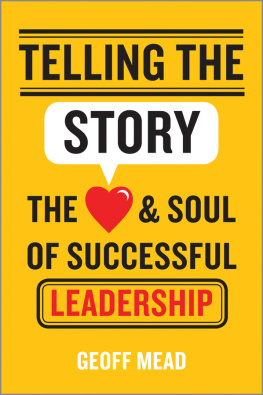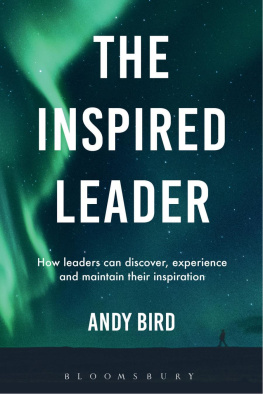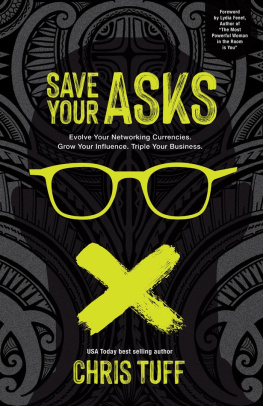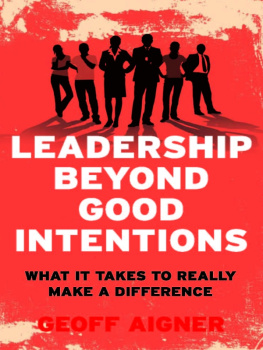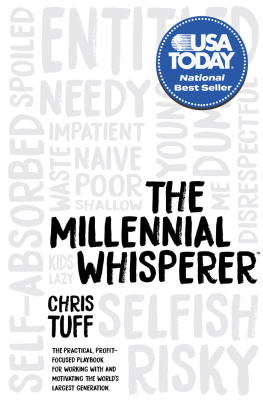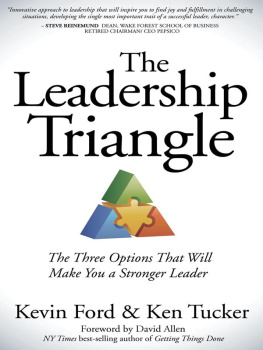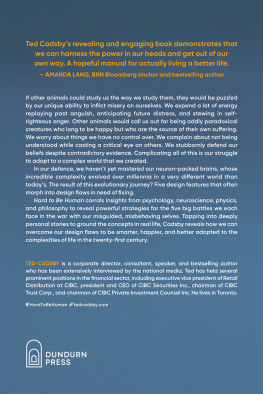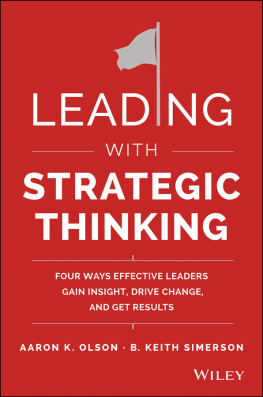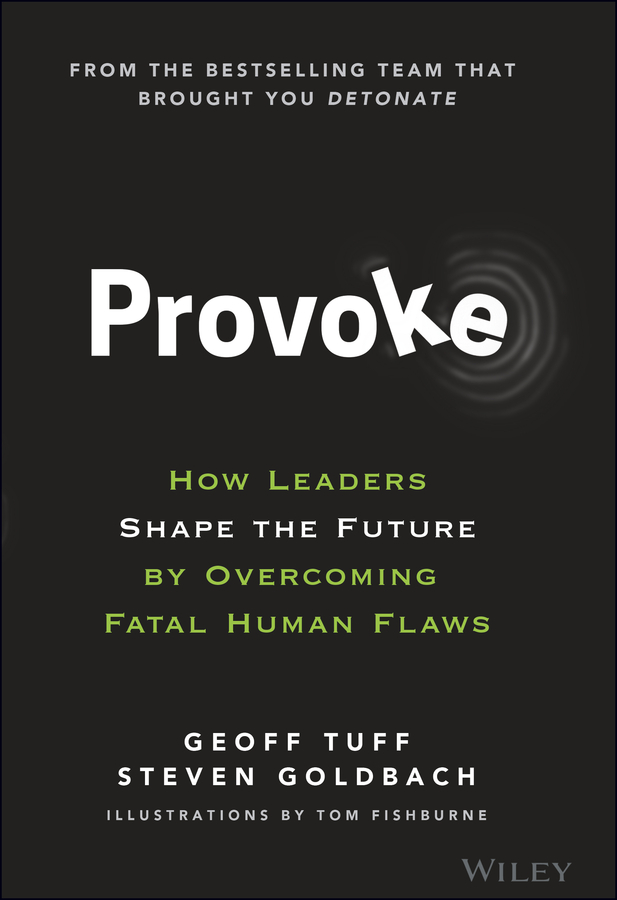
Table of Contents
Guide
Pages
FROM THE BEST SELLING TEAM THAT BROUGHT YOU DETONATE
Provoke
HOW LEADERS SHAPE THE FUTURE BY OVERCOMING FATAL HUMAN FLAWS
GEOFF TUFF
STEVEN GOLDBACH
ILLUSTRATIONS BY TOM FISHBURNE

Copyright 2021 by John Wiley & Sons, Inc. All rights reserved.
Published by John Wiley & Sons, Inc., Hoboken, New Jersey.
Published simultaneously in Canada.
No part of this publication may be reproduced, stored in a retrieval system, or transmitted in any form or by any means, electronic, mechanical, photocopying, recording, scanning, or otherwise, except as permitted under Section 107 or 108 of the 1976 United States Copyright Act, without either the prior written permission of the Publisher, or authorization through payment of the appropriate per-copy fee to the Copyright Clearance Center, Inc., 222 Rosewood Drive, Danvers, MA 01923, (978) 750-8400, fax (978) 646-8600, or on the Web at www.copyright.com. Requests to the Publisher for permission should be addressed to the Permissions Department, John Wiley & Sons, Inc., 111 River Street, Hoboken, NJ 07030, (201) 748-6011, fax (201) 748-6008, or online at http://www.wiley.com/go/permissions.
Limit of Liability/Disclaimer of Warranty: While the publisher and author have used their best efforts in preparing this book, they make no representations or warranties with respect to the accuracy or completeness of the contents of this book and specifically disclaim any implied warranties of merchantability or fitness for a particular purpose. No warranty may be created or extended by sales representatives or written sales materials. The advice and strategies contained herein may not be suitable for your situation. You should consult with a professional where appropriate. Neither the publisher nor author shall be liable for any loss of profit or any other commercial damages, including but not limited to special, incidental, consequential, or other damages.
For general information on our other products and services or for technical support, please contact our Customer Care Department within the United States at (800) 762-2974, outside the United States at (317) 572-3993 or fax (317) 572-4002.
Wiley publishes in a variety of print and electronic formats and by print-on-demand. Some material included with standard print versions of this book may not be included in e-books or in print-on-demand. If this book refers to media such as a CD or DVD that is not included in the version you purchased, you may download this material at http://booksupport.wiley.com. For more information about Wiley products, visit www.wiley.com.
Library of Congress Cataloging-in-Publication Data
Names: Tuff, Geoff, 1970- author. | Goldbach, Steve, 1973- author.
Title: Provoke : how leaders shape the future by overcoming fatal human flaws / Geoff Tuff, Steven Goldbach.
Description: Hoboken, New Jersey : Wiley, [2021] | Includes index.
Identifiers: LCCN 2021020639 (print) | LCCN 2021020640 (ebook) | ISBN 9781119764472 (cloth) | ISBN 9781119787556 (adobe pdf) | ISBN 9781119787549 (epub)
Subjects: LCSH: Leadership. Classification: LCC HD57.7 .T865 2021 (print) | LCC HD57.7 (ebook) | DDC 658.4/092dc23
LC record available at https://lccn.loc.gov/2021020639
LC ebook record available at https://lccn.loc.gov/2021020640
Back Cover Cartoon: Tom Fishburne
Cover design: Paul McCarthy
For our families: Martha, Michelle, our kids, our siblings, and especially our parents, who originally provoked us to look at the world inquisitively.
INTRODUCTION
Kids love rollercoasters.
Not all kids, and not all rollercoasters but by and large they just love them.
Although they exhibit patience for nothing else, they are willing to wait in a long line just to get a few minutes of thrill. They smile with glee as the car grinds and clacks up the track at a snail's pace, anticipating the hair-raising freefall that comes on the other side when all that potential energy is converted to kinetic. Many of them even put up their hands as the car moves from one phase to the next to increase the thrill level, testing the safety design of the harness that is keeping them inside. Not knowing precisely what's coming doesn't scare them. It excites them.
In adulthood, it's safe to say one's relationship with rollercoasters changes. There are some who still love them, but our (albeit unscientific) experience suggests it becomes a smaller and smaller proportion of the population as we age. For those who do not enjoy rollercoasters, the thrill is gone and the experience is quite literally the opposite of the glee of youth. Instead of eyes wide open, looking around at the world and what's to come, the eyes stay clamped shut in the hope that not seeing will make the experience less painful. Instead of testing the boundaries of the safety system by raising your arms, riders freeze in place, white-knuckling the safety bar, fingernails dug in, just praying for a return to stable ground. Instead of seeing what happens, these riders wish for a mental map of what's coming next and desperately hope that the whole thing will just end as quickly as possible.
The physical experience is the same the feel of the car, the path of the track, and the centripetal force bolstered by redundant safety mechanisms. But the emotional reaction to the experience is fundamentally different.
The history of leadership is chock-full of people who look like both types of riders: those who embrace the ride and others whose fixation on each possible pitfall renders them immobile. Both groups, in past decades, have had a reliable foundation on which to ride, with predictable outcomes linked either to carefree confidence that everything is on a safe path or obsessive overanalysis of knowable details. But the plight of each archetype is complicated by the realities of today's environment, which are serving up increasingly unpredictable twists, crests, and dives.
Whether their bias has been to follow the momentum of past experience or to call for ever-increasing burdens of analytical proof, leaders will have a harder and harder time anticipating and capitalizing on the peaks. Yet it's at these peaks when new opportunities shift from the possibility of if to the inevitability of when. Past data and experience are proving less useful and, to make matters worse, most leaders (whether they know it or not) are forced to act with blinders on. Basic human cognitive biases what we call fatal flaws narrow individual and organizational peripheral vision and lead to all-too-typical dysfunction.
The best leaders rise above these constraints to gain perspective; they set aside their terror of the ride and summon their inner child, who can better deal with the twists and turns. They recognize and even appreciate that while they may not be able to control all the outcomes, they can plan for and control their reactions.
These days, the conviction to act especially in the absence of perfect data is the only way to provoke the future you desire. Action creates potential energy. Action allows you to position yourself to see the peak sooner and more clearly than others. Action gives you the power to move through the phase change of if to when so that you can make the most use of the kinetic energy when it's released.
And action, in an uncertain world, is increasingly the best way to learn. If you don't act with purpose, your once-thriving business could suddenly become a wind-down firm, operating on borrowed time.
Next page

